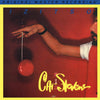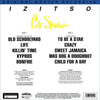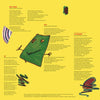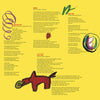







Cat Stevens – Izitso (200g, Half-speed Mastering)
ORDER LIMITED TO ONE ITEM PER CUSTOMER
Cat Stevens – vocals, Epiphone Casino electric guitar, Ovation guitar, electric guitar, acoustic guitar, steel guitar, guitar synthesizer, bouzouki, piano, celesta, harpsichord, Wurlitzer electric piano, Fender Rhodes, Polymoog, Moog synthesizer, Minimoog, ARP String Synthesizer, ARP 2600, Yamaha CS-80, Yamaha GX-1, Yamaha EA5R electronic organ, music sequencer,[5] drums, percussion, harmonica, brass arrangements [click here to see more vinyl featuring Cat Stevens]
Chick Corea – electric piano on "Bonfire" and "Was Dog a Doughnut?" [click here to see more vinyl featuring Chick Corea]
Jean Roussel – Hammond organ, piano, organ, synthesizer, ARP String Synthesizer, Yamaha CS-80, glockenspiel, vibraphone, string and brass arrangements
Barry Beckett – organ on "Killin' Time", piano and electric piano and "Child for a Day"
Tim Henson – piano on "Killin' Time", organ on "Child for a Day"
Broderick Smith – harmonica on "Sweet Jamaica"
Marjorie Lagerwall – harp on "Sweet Jamaica"
Ray Gomez – electric guitar on "Was Dog a Doughnut?"
Pete Carr – electric guitar on "Killin' Time" and "Child for a Day"
Jim Johnson – rhythm guitar on "Killin' Time"
Weldon Myrick – steel guitar on "(I Never Wanted) to Be a Star"
Reggie Young – electric guitar on "(I Never Wanted) to Be a Star"
Bruce Lynch – bass guitar, music sequencer on "Was Dog a Doughnut?"
David Hood – bass guitar on "Killin' Time" and "Child for a Day"
Andy Newmark – drums and percussion on "(Remember the Days of the) Old Schoolyard" and "Kypros" and "Bonfire" and "Sweet Jamaica"
Bill Berg – drums and percussion on "Life" and "(I Never Wanted) to Be a Star" and "Crazy"
Barry Morgan – additional drums on "Life"
Roger Hawkins – drums and percussion on "Killin' Time" and "Child for a Day"
Elkie Brooks – vocals on "(Remember the Days of the) Old Schoolyard"
Suzanne Lynch – backing vocals on "(Remember the Days of the) Old Schoolyard" and "Life" and "Sweet Jamaica"
Carla Benson – backing vocals on "Sweet Jamaica"
Evette Benton – backing vocals on "Sweet Jamaica"
Barbara Ingram – backing vocals on "Sweet Jamaica"
David Campbell – string and brass arrangements
Gene Page – string and brass arrangements
Written by Cat Stevens (A1 to B4), David Gordon (B5), Paul Travis (B5)
1 LP, gatefold jacket
Limited numbered edition
Original analog Master tape : YES
Half Speed Mastering
Heavy Press : 200g SuperVinyl
Record color : black
Speed : 33 RPM
Size : 12'’
Stereo
Studio
Record Press : unspecified
Label : MOFI
Original Label : Island
Recorded 18 September 1976 – March 1977 at Muscle Shoals Sound Studio, Sheffield, Alabama ; Sound 80 Studios, Minneapolis, Minnesota ; Ardent Studios, Memphis, Tennessee ; Le Studio, Morin Heights, Quebec, Canada ; Sweet Silence Studios, Copenhagen, Denmark
Engineered by Dee Robb, Freddy Hansson, Gene Eichelberger, Jerry Masters, John Kelly, Ken Frieson, Mike Ross, Mike Stavros, Nick Blagona, Paul Martinson, Tom Jung
Produced by Cat Stevens, David Kershenbaum
Mastered by Bernie Grundman
Originally released in April 1977
Reissued in July 1996
Tracks:
Side A:
- (Remember The Days Of The) Old Schoolyard 2:44
- Life
- Killin' Time
- Kypros
- Bonfire
Side B:
- (I Never Wanted) To Be A Star
- Crazy
- Sweet Jamaica
- Was Dog A Doughnut
- Child For A Day
Reviews :
“Cat Stevens bounced back from the lackluster Numbers with an album of pop/rock songs that brought his usual rhythmic folk-rock into contemporary style with the Muscle Shoals rhythm section, a snappy Dave Kershenbaum production, and lots of synthesizers. Most of the songs were unusually lightweight, but the autobiographical "(I Never Wanted) To Be a Star" explored Stevens' ambivalence about being in the music business, an attitude that would find him dropping out and finding religion after one more album. In the meantime, Izitso produced a final Top 40 hit in "(Remember the Days of The) Old Schoolyard" and a singles-chart entry in the instrumental "Was Dog a Doughnut." As a result, Stevens returned to the Top Ten LPs list with a ninth straight gold album, his last.” AllMusic Review by William Ruhlmann
Half-speed mastering. In half-speed mastering, the whole process is slowed down to half of the original speed. A typical 33 1/3 rpm record is cut at 16 2/3 rpm. The source material is also slowed down (reducing the pitch in the process) meaning the final record will still sound normal when played back. Slowing the whole process down allows more time, which means the end result sounds better and is more efficient — allowing engineering to minimize the effects of inherent limitations within the vinyl format. The result is a more accurate and more open high-frequency response in the half speed vinyl when compared with a normal speed recording.
Ratings :
AllMusic : 3 / 5 , Discogs : 4,58 / 5




